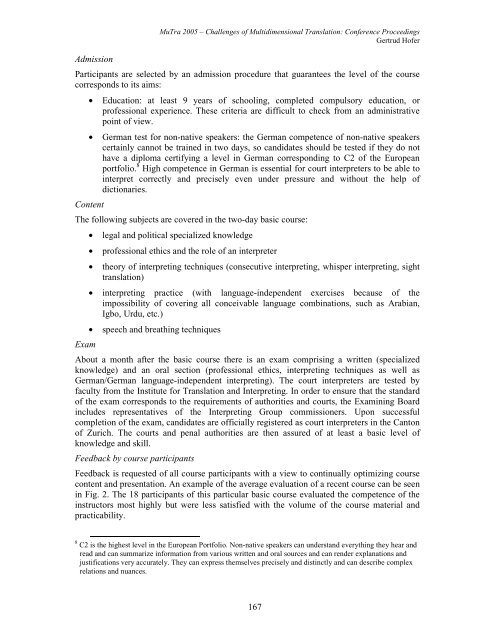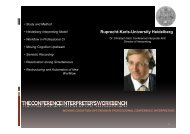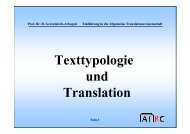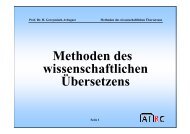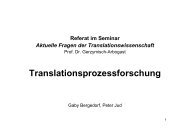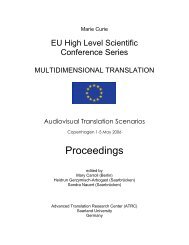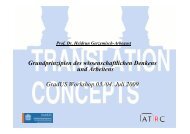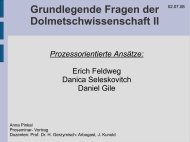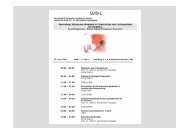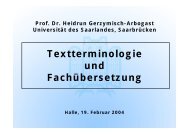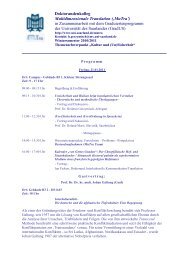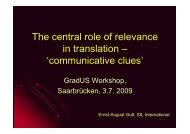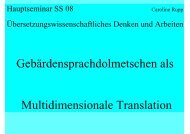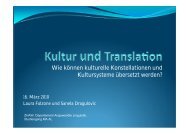Proceedings - Translation Concepts
Proceedings - Translation Concepts
Proceedings - Translation Concepts
Create successful ePaper yourself
Turn your PDF publications into a flip-book with our unique Google optimized e-Paper software.
Admission<br />
MuTra 2005 – Challenges of Multidimensional <strong>Translation</strong>: Conference <strong>Proceedings</strong><br />
Gertrud Hofer<br />
Participants are selected by an admission procedure that guarantees the level of the course<br />
corresponds to its aims:<br />
• Education: at least 9 years of schooling, completed compulsory education, or<br />
professional experience. These criteria are difficult to check from an administrative<br />
point of view.<br />
• German test for non-native speakers: the German competence of non-native speakers<br />
certainly cannot be trained in two days, so candidates should be tested if they do not<br />
have a diploma certifying a level in German corresponding to C2 of the European<br />
portfolio. 8 High competence in German is essential for court interpreters to be able to<br />
interpret correctly and precisely even under pressure and without the help of<br />
dictionaries.<br />
Content<br />
The following subjects are covered in the two-day basic course:<br />
Exam<br />
• legal and political specialized knowledge<br />
• professional ethics and the role of an interpreter<br />
• theory of interpreting techniques (consecutive interpreting, whisper interpreting, sight<br />
translation)<br />
• interpreting practice (with language-independent exercises because of the<br />
impossibility of covering all conceivable language combinations, such as Arabian,<br />
Igbo, Urdu, etc.)<br />
• speech and breathing techniques<br />
About a month after the basic course there is an exam comprising a written (specialized<br />
knowledge) and an oral section (professional ethics, interpreting techniques as well as<br />
German/German language-independent interpreting). The court interpreters are tested by<br />
faculty from the Institute for <strong>Translation</strong> and Interpreting. In order to ensure that the standard<br />
of the exam corresponds to the requirements of authorities and courts, the Examining Board<br />
includes representatives of the Interpreting Group commissioners. Upon successful<br />
completion of the exam, candidates are officially registered as court interpreters in the Canton<br />
of Zurich. The courts and penal authorities are then assured of at least a basic level of<br />
knowledge and skill.<br />
Feedback by course participants<br />
Feedback is requested of all course participants with a view to continually optimizing course<br />
content and presentation. An example of the average evaluation of a recent course can be seen<br />
in Fig. 2. The 18 participants of this particular basic course evaluated the competence of the<br />
instructors most highly but were less satisfied with the volume of the course material and<br />
practicability.<br />
8 C2 is the highest level in the European Portfolio. Non-native speakers can understand everything they hear and<br />
read and can summarize information from various written and oral sources and can render explanations and<br />
justifications very accurately. They can express themselves precisely and distinctly and can describe complex<br />
relations and nuances.<br />
167


